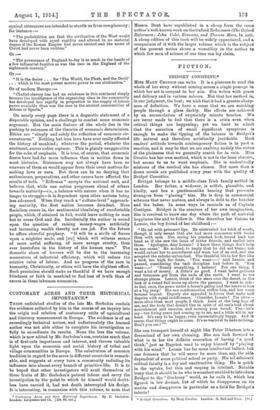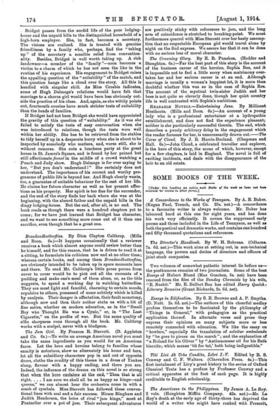FICTION.
BRIDGET CONSIDINE.*
Miss MARY CR0SBIE can write. It is a pleasure to read the
whole of her story without coming across a single passage in which her art is unequal to her aim. She writes with grace and delicacy and in various colours. Not that her method is, in our judgment, the best ; we wish that it had a greater sharp- ness of definition. We have a sense that we are watching people through a glass darkly. Her effects are achieved by an accumulation of exquisitely minute touches. We
are never made to feel that there is a crisis even when critical things are happening; yet we have to admit that the accretion of small significant symptoms is enough to make the tipping of the balance in Bridget's life natural and therefore artistically justifiable. Most readers' attitude towards contemporary fiction is in part a reaction, and it may be that we are exalting unduly the virtue
of the plainness that we generally search for in vain. Miss Crosbie has her own method, which is not in the least obscure,
but seems to us to want emphasis. She is undoubtedly mistress of the method she has chosen. Not more than a dozen novels are published every year with the quality of
Bridget Considine.
Bridget belongs to a middle-class Irish family settled in
London. Her father, a widower, is selfish, plausible, and kindly, and has a gentlemanlike bearing that prevents strangers from " placing" him. He is deep in commercial
schemes that never mature, and always in debt to the butcher and the baker. In some ways he reminds us of Captain Costigan. Bridget is the creature of her own imagination.
She is resolved to know one day where the path of material happiness lies and to follow it. She describes her visions to Lennie, the boy friend of her childhood :—
"He sat with primmed lips. He mistrusted her trick of words, though it only meant that she had more commerce with books than with men. She, seeing his pinched look, tossed back her head as if she saw the faces of better friends, and smiled into them. 'Apologies, dear Lennie ! I know these things don't help on any cause.' He nodded, to imply that he did not blame, but would exhort her to amendment and warn her of an end, and she accepted the rebuke untouched. The thankful life in her flew like a bird, too high for fears. 'You want= said Lennie, and paused, considering the task discipline had before it. • You want—"Nearly everything, I believe! For one thing, I want slot of money. A little's no good. I want laden galleons and treasures got from the ends of the earth. I want to see strange places. Lennie, think of the stars over the desert, or the look of a round full moon up above the pampas. I want to ride : to feel, once, the grass under a horse's gallop and the heave of him at a big jump.' She saw condemnation stiffen him, and her want became urgent. Eagerly she appealed to forces that make and deprive with equal indifference. ' Consider, Lennie ! I'm alive— more alive than most people, I think. Look at the long legs of me, and the body that doesn't tire in spite of all one's told about nourishment and exercise, and earning your bread. I've—let's say—ten living years just coming up to me, and a little wit in my head. It's easy to be happy, even excruciatingly happy. And it • seems that things ought to come. It's so wasteful to have nothing. Don't you see ?"
She can transport herself at night like Peter Ibbetson into a dreamland of her own choosing. She can look forward to
what is to her the definite recreation of having "a good think," just as Bagehot used to enjoy himself by "playing with his mind." Lennie has far more intellectual ballast, but one foresees that he will never be more than, say, the able dependent of some political school or party. His nil admirari critical faculty is a dry and unattractive thing. He is quick in the uptake, but thin and rasping in intellect. Notable irony that it should be he who is somehow enabled to introduce Bridget to the "Duchessy " world, as he calls it, which has figured in her dreams, but of which he disapproves on its merits, and disapproves in particular as a field for Bridget's talents !
• Bridget Considine. By Diary Crosbie. London: G. Bell and Sons. [Gs.]
Bridget passes from the sordid life of the poor lodging- house and the unpaid bills to the distinguished household of a high-born employer. She, in fact, becomes a secretary. The visions are realized. She is treated with genuine friendliness by a family who, perhaps, find the " taking up " of the secretary a sensible relief from convention- ality. Besides, Bridget is well worth taking up. A rich landowner—a member of the "family "—soon becomes a victim to a charm of which he has not seen the like in the routine of his experience. His engagement to Bridget raises the appalling question of the " suitability" of the match, and this question hangs like a cloud over the story. All this is handled with singular skill. As Miss Crosbie indicates, some of Hugh Delmege's relations would have felt that marriage to a chorus girl would have been less obviously out- side the practice of his class. And, again, as she wittily points out, fourteenth cousins have much stricter tests of suitability than the heads of families.
If Bridget had not been Bridget she would have appreciated the gravity of this question of " suitability." As it was she failed to satisfy the tests of easy conversation when she was introduced to relations, though the tests were well within her ability. She has to be retrieved from the stables to tidy herself up in a desperate hurry when she is about to be inspected by somebody who matters, and, worse still, she is without remorse. She cuts a luncheon party at the great house in St. James's Square, and is found by her pained but still affectionate fiancé in the middle of a crowd watching a Punch and Judy show. Hugh Delmege is for ever saying to her, " But you don't understand!" She certainly does not understand. The importance of his correct and worthy pro- gramme of public life is beyond her. And Hugh clearly wants, too, a guarantee of suitable behaviour for the rest of her life. He claims her future character as well as her present affec- tions as his property. Her spirit is too fine for the surrender, and the end of the story finds her back where she was at the beginning, with the absurd father and the unpaid bills in the dingy lodging-house. But the end, after all, is no end. The book reads as though there were a hundred chapters yet to come; for we have just learned that Bridget has character, and we want to see something more come out of it than one sacrifice, even though that be a great one.



































 Previous page
Previous page